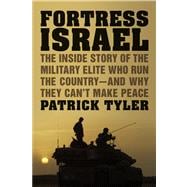
Patrick Tyler worked for twelve years at The Washington Post before joining The New York Times in 1990, where he served as chief correspondent. His books include Running Critical, A Great Wall (which won the 2000 Lionel Gelber Prize), and A World of Trouble. He lives in Washington, D.C.
“Fortress Israel is the definitive historical and analytical account of the role that Israel’s military has played both in Israel itself and in the wider Middle East. In Patrick Tyler’s deeply reported and very well written account, one learns how a militarized Israeli culture has permeated the decision making of Israel’s governments for decades and how that culture affects the calculus of its politicians today. If you want to understand Israel’s future—and also how that future may play out in the Middle East—this book is mandatory reading.” —Peter L. Bergen, author of Manhunt: The Ten-Year Search for Bin Laden from 9/11 to Abbottabad
“In this exceptional book, Patrick Tyler demonstrates with meticulous documentation and revealing interviews with the country’s national security experts how Israel’s founding military and intelligence leaders were essential to the survival of a young nation. Tyler also tackles the vexed question of our era: Will Israel’s warrior ethos and its legacy of zero-sum strategies for dealing with its Arab neighbors and the Palestinians prevent it from crafting a lasting peace? Tyler’s analysis of how much the world lost with the assassination of Yitzhak Rabin is definitive and heartbreaking. Fortress Israel is essential reading for students of the Middle East.” —Howell Raines, former executive editor of The New York Times
“With Fortress Israel, Patrick Tyler takes his place in the first rank of historians of Israel and the modern Middle East. He presents a provocative but objective look at the militarism that has driven Israel’s leaders since the founding of the state and explains vividly—without ideological cant or bias—why generations of tough-minded sabras have found it so difficult to convert their battlefield successes into a lasting peace.” —Terence Smith, Israel correspondent for The New York Times during the Six-Day and Yom Kippur Wars
“A rare and often disturbing portrait of Israel’s military elite, with all its foibles, rivalries, and vicious infighting.” —Martin van Creveld, author of The Land of Blood and Honey: The Rise of Modern Israel
The New copy of this book will include any supplemental materials advertised. Please check the title of the book to determine if it should include any access cards, study guides, lab manuals, CDs, etc.
The Used, Rental and eBook copies of this book are not guaranteed to include any supplemental materials. Typically, only the book itself is included. This is true even if the title states it includes any access cards, study guides, lab manuals, CDs, etc.